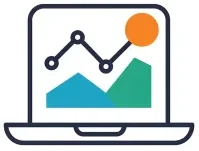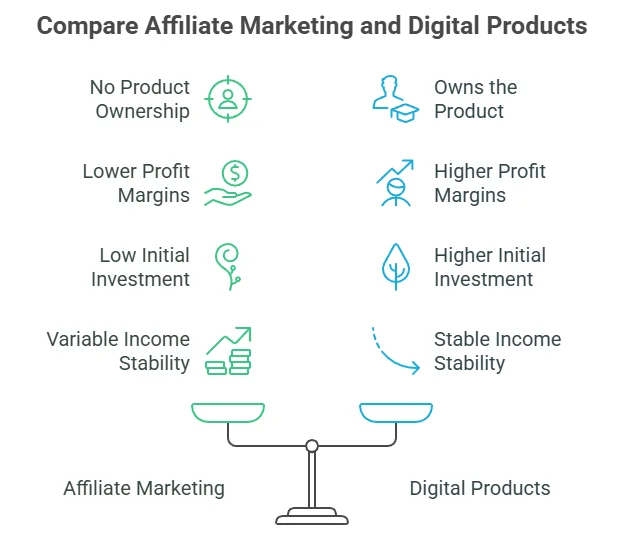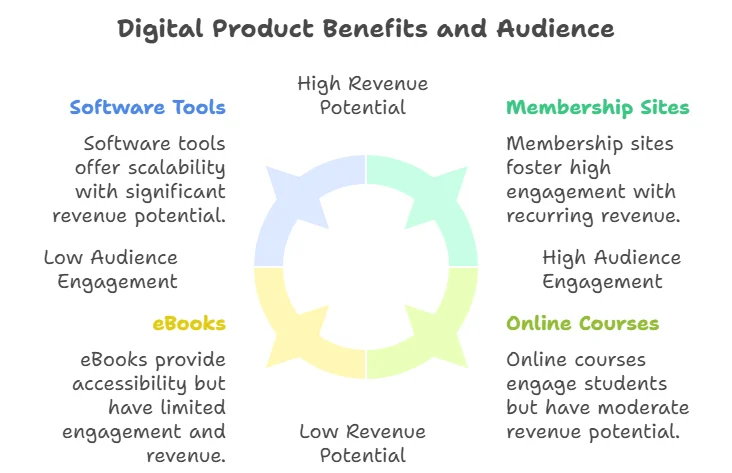 ATTENTION: Want to Learn Affiliate Marketing from Successful Affiliates?
Join this FREE community where successful marketers share their secrets!
Learn directly from highly successful affiliate marketers
Access free, actionable training content regularly
Connect with an active community of over 5,000 members
Network with multiple six-figure earning affiliates
Get your questions answered by real experts
JOIN FREE NOW!
ATTENTION: Want to Learn Affiliate Marketing from Successful Affiliates?
Join this FREE community where successful marketers share their secrets!
Learn directly from highly successful affiliate marketers
Access free, actionable training content regularly
Connect with an active community of over 5,000 members
Network with multiple six-figure earning affiliates
Get your questions answered by real experts
JOIN FREE NOW!
When exploring ways to make money online, you might come across two popular approaches: Affiliate Marketing Vs Digital Products. Both offer unique benefits, but they also have key differences. Understanding these can help you choose the right path for your online business endeavors.
What is Affiliate Marketing?
Affiliate marketing is a performance-based business model where you earn a commission by promoting someone else’s product or service. You typically join an affiliate program, receive a unique tracking link, and earn a percentage of the sale when someone makes a purchase through your link. It’s a great way to monetize your blog or social media following without creating products yourself.
What Are Digital Products?
Digital products include items like eBooks, online courses, software, and downloadable content. Unlike physical products, they are delivered electronically, which makes the creation and distribution process efficient. Selling digital products directly to consumers allows you to keep all profits instead of sharing a percentage with affiliates.
Key Differences Between Affiliate Marketing and Digital Products
| Aspect | Affiliate Marketing | Digital Products |
|---|---|---|
| Product Ownership | Does not own the product | Owns the product |
| Profit Margins | Commission-based, usually lower margins | Higher margins as there are no commissions to pay |
| Initial Investment | Low to none, often just a website | Can involve costs for creation and marketing |
| Income Stability | Variable, dependent on affiliate sales | Can be more stable with a loyal customer base |
Similarities Between Affiliate Marketing and Digital Products
- Online Focus: Both methods rely heavily on online platforms for marketing and sales.
- Scalability: You can scale both models as your audience grows without significant additional investment.
- Traffic Generation: Both require effective strategies for driving traffic to your site or offers.
- Marketing Skills: Success in both forms requires knowledge of marketing techniques, SEO, and audience engagement.
Choosing the Right Path for You
When deciding between Affiliate Marketing Vs Digital Products, consider your strengths and resources:
- If you enjoy creating content and have expertise in a specific area, creating **digital products** could be your best bet. This way, you can share your knowledge directly and build a brand around your offerings.
- If you prefer to promote existing products and want a low-risk way to make money, **affiliate marketing** may be the way to go. It allows you to leverage the market presence of established brands without the hassle of product development.
Pros and Cons
| Aspect | Affiliate Marketing | Digital Products |
|---|---|---|
| Pros |
|
|
| Cons |
|
|
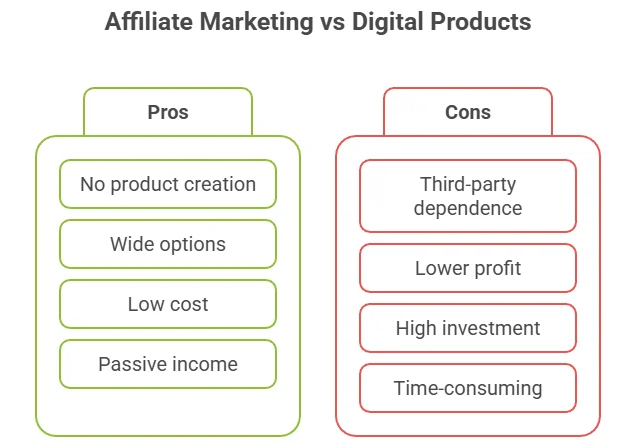
Ultimately, both Affiliate Marketing Vs Digital Products can be lucrative. They cater to different skills and preferences, allowing you to choose what resonates more with you. If you want to learn more about affiliate marketing, visit Affiliate Program Directory. For those interested in creating digital products, check out Udemy for ideas on course creation.
In the end, the choice between Affiliate Marketing Vs Digital Products will depend on your goals and how you want to engage with your audience. By weighing the pros and cons, you can find the best fit for your online business journey.
The Pros and Cons of Affiliate Marketing
Affiliate marketing has become a popular way for individuals and businesses to earn income online. It involves promoting products or services of other companies and earning a commission for each sale or lead generated through your marketing efforts. However, like any other business model, it comes with its own set of advantages and disadvantages. Let’s explore the pros and cons of affiliate marketing to help you decide if it’s the right fit for you.
Benefits of Affiliate Marketing
One of the key attractions of affiliate marketing is its potential for passive income. Once you set up your affiliate links, you can earn money while you sleep. Here are more benefits:
- Low Startup Costs: You can start affiliate marketing with minimal investment. Often, the only costs are related to hosting a website or running ads.
- Flexibility: You can work from anywhere, at any time. This flexibility appeals to many who want to balance work with personal life.
- Diverse Income Streams: As an affiliate marketer, you can promote multiple products from various companies, allowing you to diversify your income.
- No Inventory Management: You don’t need to deal with storing or shipping products, which is a significant advantage.
Challenges of Affiliate Marketing
Despite its benefits, affiliate marketing also presents some challenges that you should consider. These can affect your overall success in the field:
- High Competition: Many niches are saturated, making it tough to stand out. You must find unique ways to market your affiliate links.
- Dependence on Merchants: Your income is tied to the performance of the products you promote. If a merchant changes their commission structure or discontinues a product, your earnings can be affected.
- Steep Learning Curve: Without knowledge of SEO, content marketing, and social media, you might struggle initially. Educating yourself is crucial to long-term success.
- Building Trust Takes Time: Establishing authority in the chosen niche is essential. This process requires consistent effort and patience before you can expect to see substantial returns.
Financial Potential of Affiliate Marketing
To further illustrate the financial aspect of affiliate marketing, let’s consider a simple table that outlines potential earnings based on commission rates and sales generated.
| Product Price | Commission Rate | Sales per Month | Monthly Earnings |
|---|---|---|---|
| $50 | 10% | 20 | $100 |
| $100 | 15% | 10 | $150 |
| $200 | 12% | 5 | $120 |
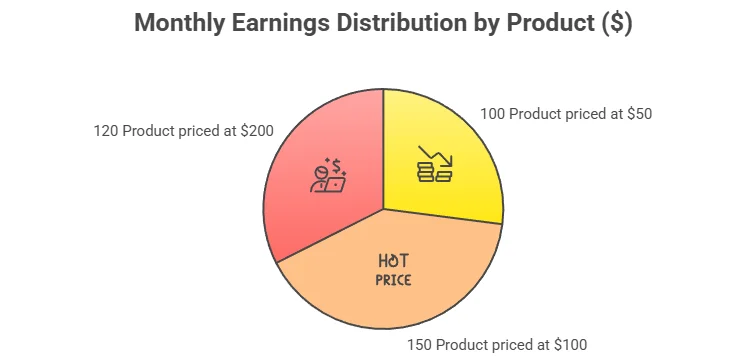
The earnings potential can vary significantly based on your marketing strategies and the affiliate programs you choose to engage with. Popular affiliate networks, like Amazon Associates and ClickBank, offer a variety of products that affiliates can promote to maximize their income.
Tips for Success in Affiliate Marketing
To achieve success in affiliate marketing, consider these actionable tips:
- Choose a niche that you are passionate about and has a demand for products.
- Update your content regularly to improve your SEO ranking and visitor engagement.
- Create valuable content that solves problems or meets needs—this builds trust with your audience.
- Utilize social media platforms to expand your reach and drive traffic to your affiliate links.
Understanding the pros and cons of affiliate marketing equips you to make informed decisions. It’s essential to weigh these factors carefully. With the right approach and strategies, you can turn affiliate marketing into a lucrative income stream. For those wanting to dive deeper, consider checking out resources on affiliate marketing from sites like HubSpot or Neil Patel.
How to Create and Market Your Own Digital Products
Creating and marketing your own digital products can provide a lucrative revenue stream and a fulfilling way to share your expertise. Whether you want to develop online courses, eBooks, or software, understanding the steps necessary to create these products and successfully market them will set you on the path to success.
Identify Your Niche
Before you start creating a digital product, it’s crucial to identify your niche. Ask yourself:
- What am I passionate about?
- What are my areas of expertise?
- What problems can I solve for others?
- Is there a market for my idea?
Once you identify a niche, conduct research to gauge the demand. Utilize tools like Google Trends and social media to understand what your target audience is talking about.
Design Your Digital Product
With your niche in mind, it’s time to create your product. Depending on what you choose, the methods will differ.
- Online Courses: Use platforms like Teachable or Udemy to structure your content.
- eBooks: Utilize writing software like Scrivener for easy organization of your material.
- Software or Apps: If you’re tech-savvy, consider learning coding through resources like Codecademy or hire a developer to help.
Develop a Marketing Strategy
Your digital product may be top-notch, but without effective marketing, it may go unnoticed. Here are some proven strategies:
- Build a Website: Create a space to showcase your products. WordPress is a great platform that allows you to customize easily.
- Leverage Social Media: Use Facebook, Instagram, and Twitter to promote your offerings. Create engaging content around your products and share tips or insights.
- Email Marketing: Start building an email list as soon as possible. Use services like Mailchimp to manage your campaigns and engage with your audience.
- Content Marketing: Write blog posts or create videos that provide value related to your product. This positions you as an authority in your niche and drives traffic to your site.
Set Your Pricing
Deciding on pricing can be challenging. Consider these factors:
- What are similar products selling for?
- What is the perceived value of your product?
- Will you offer discounts or bundles to attract buyers?
You may want to start with a lower price to attract initial customers and then gradually increase it as you gather testimonials and refine your offering.
Utilize Affiliate Marketing
Consider collaborating with influencers or bloggers in your niche. Here’s how:
- Create an affiliate program using plugins like ThirstyAffiliates.
- Offer affiliates a commission for every sale they generate.
- Provide them with marketing materials to make it easier for them to promote your product.
Track Your Progress
Once you’ve launched, it’s essential to track your success. Use Google Analytics and marketing analytics tools to understand user behavior, sales trends, and conversion rates. Here’s a simple way to track:
| Metric | Tool |
|---|---|
| Website Traffic | Google Analytics |
| Email Open Rates | Mailchimp |
| Sales Data | Shopify Analytics |
![]()
Creating and marketing your own digital products is an exciting journey that requires strategic planning and execution. By understanding your audience, designing high-quality products, and employing effective marketing strategies, you can establish a successful online venture that resonates with people and meets their needs.
Strategies for Success in Affiliate Marketing
Affiliate marketing is a powerful way to earn passive income online. With the right strategies, you can make the most of this opportunity. Here are some effective strategies to drive your affiliate marketing success.
Choose the Right Niche
Your niche significantly influences your affiliate marketing success. Selecting a niche you are passionate about helps you stay motivated. Moreover, targeting the right audience increases engagement. Consider these points:
- Research the competition in your chosen niche.
- Identify profitable products within that niche.
- Evaluate the potential audience size.
Build a Quality Website
Your website acts as your marketing hub. To make it effective, ensure it is user-friendly and loaded with valuable content. Here are some components to incorporate:
- Fast page load times.
- Mobile responsiveness.
- Clear navigation and design.
Create Valuable Content
Content is king in affiliate marketing. Produce high-quality content that provides value to your audience. This can include:
- Product reviews that are honest and detailed.
- Tutorials that show how to use products effectively.
- Informative blog posts that align with your niche.
Helpful content builds trust, encouraging visitors to make purchases through your links.
Utilize SEO Strategies
Search engine optimization (SEO) can significantly increase your visibility. Use relevant keywords in your content. Here are some techniques to implement:
- Incorporate long-tail keywords to capture specific searches.
- Use header tags to organize your content.
- Optimize your images with alt text.
Consider tools like Moz and Ahrefs for keyword research and analysis.
Leverage Social Media
Pushing your affiliate links through social media channels is an essential strategy. Here’s how you can do it:
- Share engaging posts that link back to your content.
- Use relevant hashtags to increase visibility.
- Engage with your followers through comments and replies.
Platforms like Instagram, Facebook, and Pinterest are particularly effective for reaching diverse audiences.
Build an Email List
Email marketing is a powerful tool that allows you to connect directly with your audience. To build your email list, consider:
- Offering a free resource, like an eBook or webinar, in exchange for email addresses.
- Sending regular newsletters featuring affiliate products.
- Keeping your subscribers informed about the latest trends in your niche.
Use email marketing services like Mailchimp or ConvertKit to manage your campaigns efficiently.
Monitor and Analyze Performance
Tracking your performance helps you understand what works and what doesn’t. Use analytics tools to monitor:
- Click-through rates on your affiliate links.
- Conversion rates from various marketing channels.
- Traffic sources to your website.
Platforms like Google Analytics can provide valuable insights on visitor behavior.
Stay Informed and Adapt
The affiliate marketing landscape constantly evolves. Stay updated on trends and changes. Follow industry news through related blogs and forums. Engage in communities such as Digital Marketer and Smart Passive Income, which can offer valuable knowledge and strategies.
By implementing these strategies, you can enhance your affiliate marketing efforts. Focus on building relationships and providing value to your audience. This approach can lead to long-term success and sustainable income.
The Future of Digital Products in Online Business
The digital landscape is constantly evolving, and with it comes the future of Affiliate Marketing Vs Digital Products in online business. The shift from physical to digital has transformed how products are developed, marketed, and sold. As technology continues to advance, digital products are gaining prominence—and for good reason. They are easily scalable, often have lower production costs, and offer flexible delivery options that can benefit both creators and consumers.
The Rise of Digital Products
Digital products encompass a wide range of offerings, including eBooks, online courses, software, and downloadable content. The growing acceptance of these goods has led to a significant rise in their market presence. Several factors contribute to this trend:
- Increased Internet Access: As more people gain access to the internet, the demand for online goods has surged.
- Convenience: Digital products can be accessed anytime, anywhere, making them extremely convenient.
- Cost-Effectiveness: Without the need for physical materials or shipping, digital goods often come at a lower price point.
- Environmental Impact: Digital products reduce the need for physical resources, contributing to a more sustainable economy.
Types of Digital Products and Their Appeal
Different types of digital products cater to various markets. Here’s how some popular categories stand out:
| Digital Product Type | Benefits | Audience |
|---|---|---|
| eBooks | Accessible on multiple devices, easy to produce | Readers, learners |
| Online Courses | Interactive content, structured learning | Students, professionals seeking skill development |
| Software Tools | Efficiency, ongoing updates, scalability | Businesses, tech-savvy individuals |
| Membership Sites | Recurring revenue, community building | Enthusiasts, ongoing learners |
Embracing New Technologies
The future of digital products is heavily influenced by technology. Innovations such as artificial intelligence, augmented reality, and immersive virtual experiences will redefine how products are created and consumed. For instance, augmented reality could allow users to experience educational content in a more engaging way, while AI can personalize learning experiences to increase engagement.
With developments in blockchain technology, digital products can incorporate owner verification and secure transactions. This could open new doors for creators, allowing for exclusive content sales and ensuring creators retain more profit. Platforms like Crypto.com are leading the way in integrating blockchain with digital products.
Marketing Strategies for Digital Products
Successful marketing strategies are crucial for anyone looking to sell digital goods. The following techniques are vital:
- Content Marketing: Create valuable content that draws your audience in. Blogs, podcasts, and videos can establish authority in your niche.
- Email Marketing: Build a list of potential customers and engage them regularly, offering exclusive deals or insights.
- Affiliate Programs: Recruit affiliates to promote your products, expanding your reach without upfront costs.
- Social Media Promotions: Utilize platforms like Instagram and Facebook to showcase your products, leveraging user-generated content to build trust.
The Importance of Customer Feedback
Your audience plays a pivotal role in evolving your digital products. Customer feedback provides insights that can guide the improvement and adaptation of your offerings. Engaging with your audience through surveys or reviews fosters a sense of community and loyalty. Platforms like SurveyMonkey can help collect valuable feedback to refine your products.
The Path Forward
As digital products continue to grow within the online business sector, those who embrace innovations and listen to their audience will thrive. The marketplace is competitive, but opportunities abound for those ready to adapt. By leveraging technology and implementing savvy marketing strategies, you can be at the forefront of the next wave of digital products.
With insights into trends and strategic approaches, you can navigate the future of digital products successfully. Stay informed, be creative, and allow the evolving digital landscape to inspire your next online venture.
Conclusion: Choosing Your Path
Choosing between Affiliate Marketing Vs Digital Products is not simply a matter of one being better than the other; it’s about aligning your passion, skills, and goals with the right approach for you. Affiliate marketing allows you to promote other people’s products, leveraging existing sales funnels and audiences, which can lead to passive income with relatively low startup costs. However, it comes with the challenge of dependency on third-party products and commissions that can fluctuate.
On the other hand, creating digital products gives you full control over your offerings and earnings. This path demands more upfront effort and resources but can yield higher returns if you provide value and effectively market your creations. Successful digital products stem from understanding your target audience and delivering solutions that meet their needs.
Both Affiliate Marketing Vs Digital Products require strategic planning and execution. Implementing proven strategies for affiliate marketing—such as building genuine relationships and providing valuable content—can significantly enhance your success. Meanwhile, the future of digital products looks bright, with opportunities for customization and personalization catering to ever-evolving consumer demands.
Ultimately, the best choice depends on your individual vision for online business. Whether you decide to dive into affiliate marketing or develop your own digital products, continuous learning and adaptation to market trends are key. Embracing both avenues may also be a viable option, allowing you to diversify income streams and minimize risks. Choose the path that excites you and start building your online empire today.
